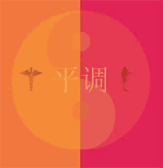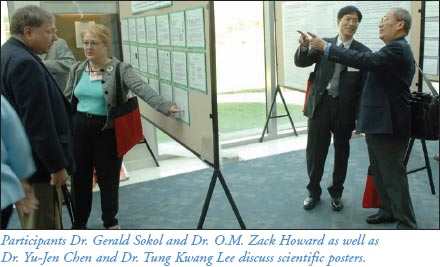Meetings and Events
Spring 2013
Vol. 8, Issue 1
Winter 2013
Vol. 7, Issue 2
Spring 2012
Vol. 7, Issue 1
Spring 2011
Vol. 6, Issue 1
Fall 2011
Vol. 6, Issue 2
Spring 2010
Vol. 5, Issue 1
Fall 2010
Vol. 5, Issue 2
Spring 2009
Vol. 4, Issue 1
Fall 2009
Vol. 4, Issue 2
Spring 2008
Vol. 3, Issue 1
Fall 2008
Vol. 3, Issue 2
Fall 2007
Vol. 2, Issue 2
Winter 2007
Vol. 2, Issue 1
Summer 2006
Vol. 1, Issue 2
Conference Jump Starts a New Era of Collaboration in Traditional Chinese Medicine Research

The National Cancer Institute's (NCI) Office of Cancer Complementary and Alternative Medicine (OCCAM) hosted an ambitious conference titled 'Traditional Chinese Medicine and Cancer Research: Fostering Collaborations; Advancing the Science,' held April 10 through 12 at the National Institutes of Health (NIH) campus. This endeavor took six months of planning and was prompted by multiple meetings with the China Academy of Chinese Medical Sciences (CACMS), a national center for TCM research, teaching, and health care in China.
Almost 200 scientists and physicians attended the conference, including more than 40 who traveled from China to participate. While the conference included posters and presentations like a standard biomedical gathering, its main purpose was to serve as an incubator for establishing new collaborative relationships between Chinese and Western scientists interested in researching Traditional Chinese Medicine (TCM) for cancer prevention, treatment, and palliation. “This meeting is about getting to know each other,” said Dr. Jeffrey D. White, Director of OCCAM, on the first day of the conference. “Hopefully, we have structured it in a way to allow people to meet each other and learn from each other, and we want to encourage that as much as possible.” A primary goal of the meeting was to provide an opportunity for NCI intramural researchers to explore specific topics that could be the subject of collaborations with Chinese investigators.
The last several decades have seen an explosion of interest in all types of complementary and alternative medicine (CAM), within both the public and the biomedical research community. TCM is unusual among modalities that fall within what is considered CAM in the West in that it is a complete medical system developed over thousands of years, encompassing physiology, pathology, and prevention and diagnosis of disease.
As Dr. Yong Ming Li from Warren Hospital, New Jersey, explained to the audience, TCM and Western medicine view the body differently. While Western medicine has traditionally used dissection to obtain knowledge of the inner workings of the body, TCM has used observation of how the body reacts to treatments to elucidate organ function. In the realm of cancer therapy, Western medicine has one target-the cancer-while TCM is also concerned with restoring energy balance, called qi, within the body.
Dr. Lorenzo Cohen from MD Anderson Cancer Center, whose research group has an ongoing, NCI-sponsored collaborative agreement with Fudan University in Shanghai, China, described his understanding of the principal of qi on the third day of the conference: “TCM examines the human being as an ecosystem in which polarities constantly interact in flowing regular cycles. The methods employed in the practice of TCM are intended to treat perceived or suspected blockages or imbalances, either excesses or insufficiencies, and to restore balance, energy flow, and vitality.”
Many aspects of TCM, such as anti-cancer herbal therapies and acupuncture, are being studied by oncologists in both China and the West. The main challenge facing researchers is how to apply modern scientific methodology to the evaluation of TCM therapies, which are traditionally highly individualized for each new patient. Two subjects that arose over and over during the three days of the conference were the vital need to understand the molecular mechanisms behind the observed efficacy of any TCM treatment and the need for product authentication and quality control.
“I would argue that it is foolish to go right to large clinical trials without reproducible product,” stated Dr. David Eisenberg, Associate Professor of Medicine at Harvard Medical School, closing the first day of the conference. “Furthermore, and this is perhaps the most important point, clinical trials alone will be insufficient. Preclinical, mechanistic studies alone will be insufficient. We absolutely… need both to authoritatively research TCM or any herbal preparation.”

Participants discussed the challenges faced in international collaborations during the second day of the conference, which provided open breakout sessions on topics ranging from human-subjects and animal-use issues to the integration of TCM and Western cancer research. On the third day of the conference, a panel of researchers from the United States, Europe, and China related their experiences with successful-and unsuccessful-collaborations in TCM: what worked and what needed work.
“I don't believe there should be Chinese medicine or Western medicine… medicine is medicine,” said Dr. Yung-Chi “Tommy” Cheng from Yale University, who closed the conference with a talk on translational research in TCM. The conference participants agreed, as they made plans to explore new applications of TCM to cancer therapy together. “I think that this conference has achieved its expected goal,” stated Dr. Liu Baoyan, Vice President of the CACMS. “We have built a bridge for future cooperation on TCM studies between scientists in the U.S. and China.”





